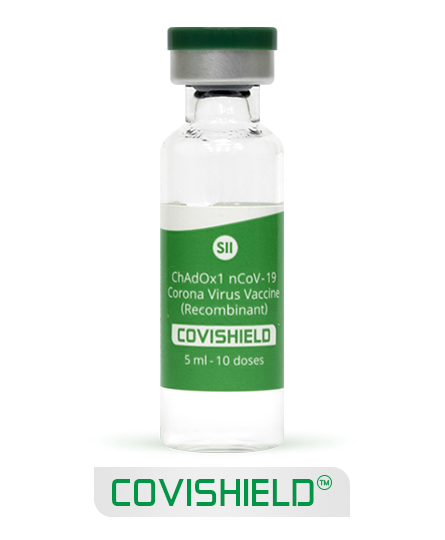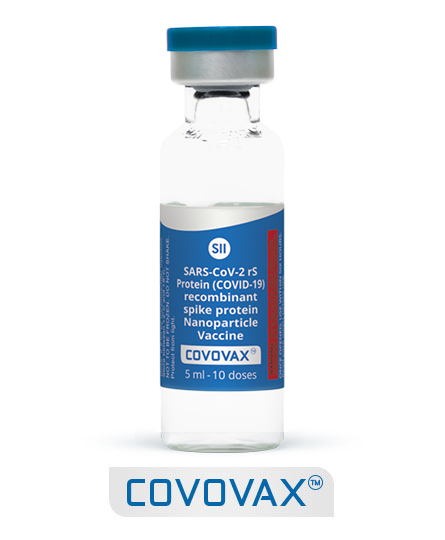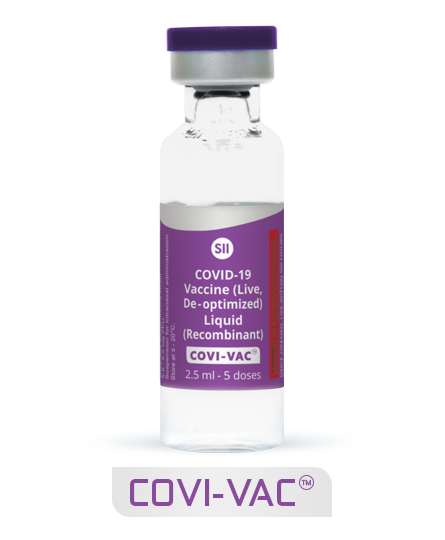SARS-CoV2 (COVID-19) Vaccine Platform
| VACCINE | PARTNER | GMP MFG. PRECLINICAL | PHASE 1 | PHASE 2 | PHASE 3 | APPROVED FOR GLOBAL SALES |
|---|---|---|---|---|---|---|
|
COVISHIELD |
AstraZeneca |
 |
||||
 COVISHIELDTM - ChAdOx1 nCoV- 19 Corona Virus Vaccine (Recombinant) is a chimpanzee adenovirus vaccine vector candidate comprising of the SARS-CoV-2 spike protein. It has been developed at Oxford University’s Jenner Institute and licensed to AstraZeneca. ChAdOx1 nCoV-19 is a recombinant replication-defective (E1 gene deleted) chimpanzee adenovirus expressing the SARS-CoV-2 spike (S) surface glycoprotein. ChAdOx1 was chosen by Jenner Institute at the University of Oxford as the most suitable vaccine technology for a SARS-CoV-2 vaccine as it generates a strong immune response and having replication deficient virus, so it cannot multiply and cause an ongoing infection in the vaccinated individual. This technology makes the vaccine safer to inoculate in the elderly and comorbid individuals. Chimpanzee adenoviral vectors are a very well-studied vaccine platform that has been used safely in thousands of subjects from 1 week to 90 years of age in various other vaccines targeting over 20 different diseases. COVISHIELDTM - ChAdOx1 nCoV- 19 Corona Virus Vaccine (Recombinant) developed in partnership with University of Oxford's Jenner Institute and AstraZeneca has been granted emergency use authorization in India by the Drugs Controller General of India (DCGI) as well as granted Emergency Use Listing (EUL) by the World Health Organization (WHO). The MHRA, UK has also granted conditional marketing authorization for the vaccine in preventing coronavirus disease (COVID-19) in individuals over 18 years of age. |
||||||
|
COVOVAX |
NOVAVAX |
 |
||||
 COVOVAXTM is a vaccine candidate in collaboration with Novavax who has developed a SARS-CoV-2 recombinant spike (S) protein vaccine (NVX-CoV2373) for the prevention of disease caused by the SARS-CoV-2 virus. NVX-CoV2373 is a protein-based vaccine candidate engineered from the genetic sequence of SARS-CoV-2, the virus that causes COVID-19 disease. NVX-CoV2373 was created using Novavax’s recombinant nanoparticle technology to generate antigen derived from the coronavirus spike (S) protein and is adjuvanted with Novavax’s patented saponin-based Matrix-MTM to enhance the immune response and stimulate high levels of neutralizing antibodies. NVX-CoV2373 contains purified protein antigen and can neither replicate, nor can it cause COVID-19. In preclinical studies, NVX-CoV2373 induced antibodies that block binding of the spike protein to cellular receptors and provided protection from infection and disease. Novovax's Matrix-MTM vaccine adjuvant is also being used with Serum Institute's malaria vaccine candidate, R21 malaria vaccine under a commercial license agreement. Novavax has a proven track record of rapid innovative vaccine development including efforts to develop vaccines against previous coronaviruses, Middle East Respiratory Syndrome (MERS-CoV), and Severe Acute Respiratory Syndrome (SARS). In both cases, Novavax’s candidate vaccines demonstrated strong immunogenicity and 100% protection against virus challenge in preclinical testing. Novavax also developed a safe and clinically immogenetic Ebola vaccine candidate that proved effective in primate studies. Novavax identified its lead candidate-demonstrating pre-clinical testing that demonstrated high immunogenicity and high levels of neutralizing antibodies, demonstrating efficacy in binding with receptors targeted by the virus. Several non-clinical studies have been completed by Novavax in many animal models such as mice, hamsters, baboons, New Zealand white rabbits and macaques which have demonstrated excellent safety and immunogenicity in all the animal models. In addition to the above, Novavax has also completed several safety and efficacy studies which demonstrate excellent safety and efficacy profile of the vaccine.
GMP manufacturing set up is currently underway at the Serum Institute of India to produce hundreds of millions of doses. |
||||||
|
CYVAC |
SpyBiotech |
 |
||||
 CYVAC is a receptor binding domain (RBD) based vaccine with a unique concept involving display of RBD on virus like particles through a simple chemical free conjugation step. The repeat display of RBD on virus-like particles (VLP) makes it a stronger immunogen having the ability to be cross-presented to the immune cells. This ability is owed to their particulate nature which allows the VLPs to be efficiently taken up by antigen presenting cells (APCs) and enter the MHC-I pathway. The vaccine candidate uses SpyBiotech’s proprietary SpyCatcher/SpyTag protein “superglue” technology to display the coronavirus spike protein on the surface of Hepatitis B surface antigen (HBsAg) VLPs. SpyCatcher/SpyTag is a platform technology which allows antigens to be displayed onto VLPs with a covalent, irreversible bond in a highly stable and effective way with specific orientation/epitope presentation and high density. It is based on classical VLP vaccine concept with proven track record of billions of doses used over several years, therefore extremely safe. VLPs are conveniently produced at high quantities and commercial scale using heterologous recombinant gene expression in yeast Hansenula polymorpha implemented at Serum Institute for its vaccine manufacturing. In addition to immunogenic effect of the VLP, simple and safe alum adjuvant is used to further enhance the immunogenicity. Serum Institute has more than two decades of manufacturing expertise in existing Hansenula polymorpha based protein expression and purification. This yeast based VLP platform is being used successfully for multiple vaccines produced by Serum Institute in volumes of more than 200 million doses annually. Billions of doses can be manufactured and distributed due to simple production process in a cost effective manner within a short period of time. Higher yield is based on yeast expression platform and conjugation/coupling recovery unlike other chemical conjugation processes which have inherent challenges. Going forward, the platform technology could be further explored for other vaccine candidates and be kept as a ready to use platform should any epidemic or pandemic situation arise in future. The vaccine has completed early clinical development in Australia with no safety concerns. Presently the formulation is being upgraded to include additional RBD variant which will increase the coverage of the vaccine and enable neutralization of most known variants of concern. |
||||||
|
COVI-VAC |
CODAGENIX |
 |
||||
 COVI-VAC is a single-dose, intranasal, live attenuated vaccine against COVID-19, being developed in collaboration with Codagenix Inc, USA. This is a live attenuated coronavirus vaccine which makes use of attenuation using a platform technology called “SAVE” Synthetic Attenuated Virus Engineering. This technology introduces hundreds of silent mutation into the genome to use Codon pairs that are underrepresented in human cells resulting in a genome de-optimized for translation in human host i.e. an attenuation process which is achieved in a very fast way. Codagenix's Synthetic Attenuated Virus Engineering (SAVE) platform, which uses synthetic biology to re-code the genes of viruses into safe and stable vaccines. COVI-VAC is designed to deliver a safe, live attenuated version of SARS-CoV-2 that may induce a more robust immune response and long-lasting cellular immunity against SARS-CoV-2 compared to other vaccines against the virus. Being a live whole virus and not limited to a single protein this vaccine is expected to induce a strong immune response not only to the spike protein but other structural as well as non-structural proteins leading to a broad immune response that may protect against drifted variants of the virus. Additionally, COVI-VAC has the potential to address several key logistical challenges to immunization against SARS-CoV-2 at a global scale. As a single-dose, intranasally-delivered vaccine, COVI-VAC
will not require a needle and syringe, nor ultra-low temperature freezers. COVI-VAC can be manufactured at large scale and can be easily administered with minimal training in a mass vaccination campaign. Phase 1 clinical trials of COVI-VAC started in January 2021 and immunization of all three dose ranging cohorts has been completed with no safety concerns. Multiple Phase 2 or 2/3 trials are being planned to be conducted in South America, Europe and Asia based on initial study data by mid-2021. |
||||||

